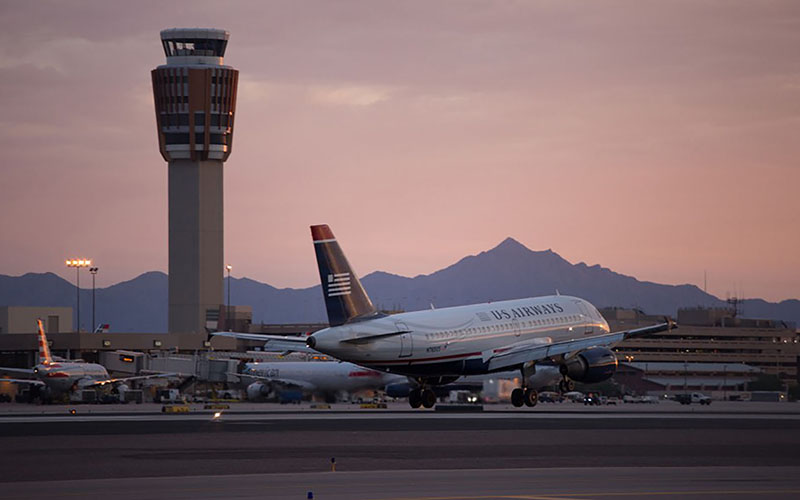
A federal court ordered the Federal Aviation Administration to start over on planning for flight paths in and out of Phoenix Sky Harbor International Airport. The current plan has led to tens of thousands of noise complaints from neighbors since it was put in place in 2014. (Photo by Coleton Berry/Cronkite News)
WASHINGTON – A federal appeals court Tuesday ordered the Federal Aviation Administration to throw out a controversial flight path plan for Phoenix Sky Harbor International Airport that sparked tens of thousands of noise complaints from neighbors.
A divided panel of the U.S. Court of Appeals for the District of Columbia Circuit said the FAA failed to analyze the impact of the new flight paths and neglected to include neighbors and local officials in the discussion process.
“By keeping the public in the dark, the agency made it impossible for the public to submit views on the project’s potential effects – views that the FAA is required to consider,” said Circuit Judge Thomas Griffith in his ruling.
The ruling tossed out the September 2014 flight path changes and ordered the FAA to start over. The changes, which put more planes over more populated parts of the city, saw airport noise complaints rise from 220 for all of 2013 to 84,264 by 2016. More than 62,000 complaints had been filed through the first six months of this year, according to airport data.
A statement from the FAA Tuesday said the agency “will carefully review the decision before deciding on our next steps.” When asked
when the flight paths might change, the agency referred to a letter it sent to city officials in 2015.
“Making changes is not as simple as turning one procedure off and turning another one on, and designing and developing possible adjustments will not be a simple or quick process,” that letter said.
Despite the potential delay on changing the flight paths, critics welcomed the court’s ruling.
“We are very pleased that the court ruled in our collective favor,” said Steve Dreiseszun, a resident of the historic F.Q. Story neighborhood in downtown Phoenix.
It was one of a group of historic neighborhoods and residents that sued the FAA. That suit was later joined with a similar lawsuit the city of Phoenix filed against the FAA over the flight plan.
“The FAA chose to fast track the changes they were implementing associated with their NextGen initiative, and in fast tracking it they ran over the citizens of our city and the residents of the historic neighborhoods particularly, and that was wrong,” Dreiseszun said.
Phoenix Mayor Greg Stanton also welcomed the ruling and said in a statement that he looks forward to the FAA trying again.
“The FAA took this step that negatively impacted the lives of thousands of Phoenix residents without seeking meaningful input from our community or the City. That’s just wrong,” Stanton’s statement said. “Today’s decision affirms that the FAA needs to go back to the drawing board and do this right.”
Similar changes were made at airports nationwide as part of an FAA plan to modernize air traffic, cutting costs and allowing for satellite guidance, among other improvements.
But while the agency was careful to follow detailed review at other airports – in Boston, Atlanta, Charlotte and elsewhere, according to the court’s ruling – it decided that changes in Phoenix did not merit that level of scrutiny and public input. That is despite the fact that the FAA had several reasons to believe the change could be controversial.
“The agency was changing routes that had been in place for a long time, on which the City had relied in setting its zoning policy and buying affected homes,” the court said. “The FAA found a ‘potential (for) controversy’ but did not notify local citizens and community leaders of the proposed changes as the agency was obligated to, much less allow citizens and leaders to weigh in.”
In a dissent, Judge David Sentelle said he agreed with the majority’s reasoning on the merits, but said the court should have rejected the case before it reached that point because the challenges to the plan were filed after a 60-day deadline on FAA orders had passed.
When he heard of the 2-1 victory for airport neighbors, Dreiseszun said he is aware that flight path changes will not come overnight.
“I know this is not instantaneous and that we’re just another step along in this process,” he said. “We are … aware that when motivated the FAA can do things in a more timely fashion. It is our view that this is a reasonable opportunity to apply the timeliness and we look forward to them adhering to the court order.”